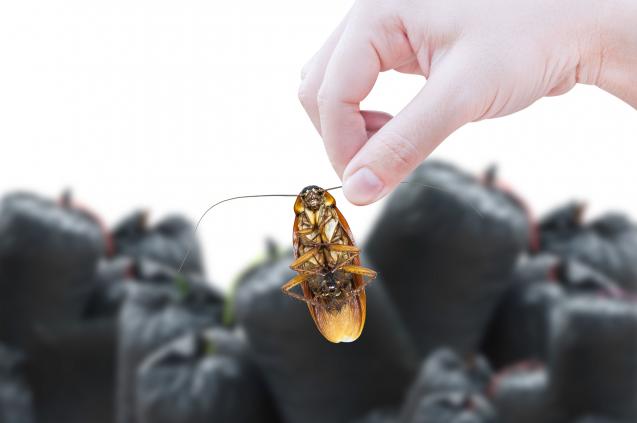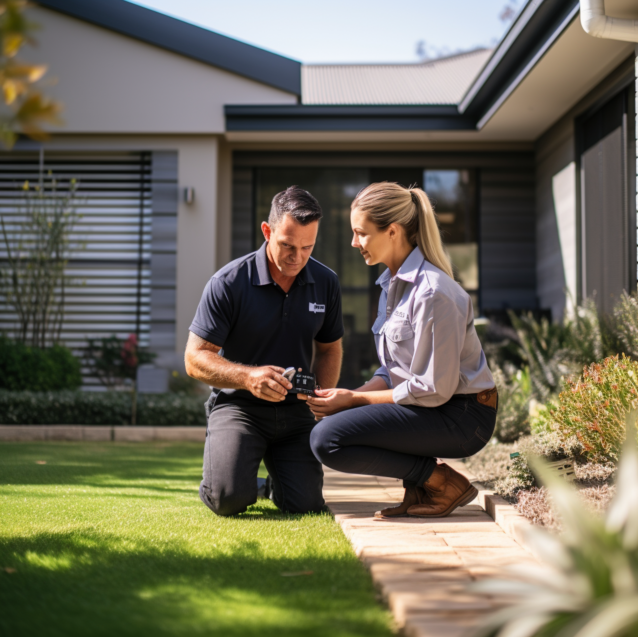
Top 50 Home Made Pest Control Products
By Pro Pest Control Sydney|April 07, 2022
No matter how hard you try, there are always going to be pests trying to take up residence in your home, your garden, or your backyard. Nothing's more frustrating that coming home to find a wasp nest on your porch or hearing a possum scuttling around on your roof while you try to sleep. The good new is that there a remedies for just about every type of pest that you might find around your home. We've scoured the web to find solutions you can make yourself to send pests to the curb.
If you're looking for a way to get rid of pests around your home, the expert has some recommendations. You may want to try one of these home made remedies. Just be sure not to let children or pets near them, as they're not safe to ingest.
1. Predators
According to the Australian Museum, lacewings and antlions are both voracious predators that feed on garden pests. In particular, some species of lacewing dine on aphids and scale. Try dissolving a spoonful of vegemite in warm a bottle of warm water and spraying it onto plants to attract them.
2. Natural Pesticide
Soak a crushed bulb of garlic in an oil of your choice. Strain off the liquid after two days and pour in a small squirt of liquid dish soap to form a concentrate. Dilute in a 1-1000 ratio with water.
3. Vinegar Herbicide
Combine a litre of vinegar with a cup of salt and brush onto weeds. This solution is very strong, so be careful to only use it on plants you want to destroy.
4. General Use Insecticide
Soak 4 chilli peppers, two garlic cloves, and 4 white onions (all chopped) in warm, soapy water overnight. Strain off the liquid and combine with a gallon of water for a general use bug-killing spray.
5. Grasshopper & Caterpillar Deterrent
Spray a mixture of one cup of molasses and one litre of water onto new plants.
6. Nematode Solution
This is a more concentrated version of the grasshopper deterrent. To cover one and a half square meters, combine a cup of molasses with one litre of water.
7. Black Spot Fungicide
Black spot doesn't just like roses, it loves them to death. One easy way is to give afflicted plants a spritz of bicarb solution. Use 3 teaspoons to one litre of water.
8. General Fungicide
A very similar bicarb solution can help with other fungal infections around the garden as well. Use a less concentrated formula of one teaspoon dissolved in a litre of warm water.
9. Aphid Spray
If you're not keen on replacing your aphid with lacewings, you can try a homemade aphid spray instead using a litre of water mixed with a couple tablespoons of soap.
10. Scale and Mealybug Preparation
Combine 4 tablespoons of liquid dish soap with a cup or so of cooking oil. Use twenty parts of water to a part of soap/oil mixture. If mixed well, the soap will help emulsify the oil and water. Put it in a sprayer and spritz affected plants.
Methods for Deterring Spiders
11. Fill gaps
Filling exterior gaps with caulk ensures that spiders don't have an entry point into your home.
12. Minty spray
Add peppermint oil to water for a minty spray that spiders find unappealing.
13. Turn over outdoor furniture
Turning furniture over to keep redbacks from nesting in dark corners.
Getting Rid of Fleas
Fleas are always a reason to take your pet to the vet, but several ways to help keep fleas at bay
.
14. Hot water wash
Wash pet bedding and soft toys in hot water weekly to kill fleas.
15. Regular bath schedule for pets
16. Homemade flea treatment
An apple cider vinegar rinse for pets after baths.
Keeping Possums in the Wild
17. Nesting boxes
Attract possums away from the house with a DIY nesting box.
18. Branch trimming
Branches can make a natural bridge to your roof if left untrimmed.
19. Mothballs in the attic
20. Leave some lights on
Away, Ants
21. Vinegar bench cleaner
Clean up counters with acidic vinegar.
22. Chalk
Ants don't like walking through chalk or powder, so drawing a line near entrances might deter them.
23. Gap filler
Wasps and Bees, Be Gone
24. Cover compost bins
Open compost bins attract wasps so make sure they're covered when not in use.
25. Cover pools
26. Garlic powder
Sprinkle it around flowers to confuse the bees' sense of smell.
27. Plant low-fragrance flowers
The scent of flowers attracts bees, so try planting less fragrant varieties like marigolds and azaleas.
Stopping Mice & Rats in Their Tracks
28. Gap filler
29. Mesh covers
Make your own mesh covers for utilities to keep rodents out.
30. Airtight containers
Keep food stowed away out of reach.
31. Do a deep clean
32. Trim branches
33. Get a cat
34. Apple cider vinegar spray
Mice don't like the smell, so try spritzing vinegar around the home.
Terminate Termites
35. Don't leave wood damp
36. Spot trap
Make your own spot trap using strips of cardboard.
37. Move mulch
Because mulch tends to stay a little wet, keep mulch away from the foundations of your home.
Killing Cockroaches
38. Bicarb Bait
A 50/50 mix of sugar and bicarb will tempt cockroaches, then quickly kill them.
39. Borax Bait
A 3-1 ratio of borax and sugar will also kill cockroaches.
40. Essential Oils
Try an essential oil spray like the spider spray above for roaches as well.
Keeping Snakes Out
41. Mow the lawn
Short grass doesn't provide cover for snakes, so they're less likely to come slither across your lawn.
42. Close openings
43. Avoid leaving open water
As with many pests on this list, ponds and pools will attract snakes.
44. Remove rubble
Rubble and other piles create a great hideout for snakes.
Avoid Moths in Closets & Pantries
45. Clean up spills
46. Toss expired foods
47. Seal dry goods
48. Freeze moth-bitten clothes
A week of freezing temperatures will kill moth larvae.
49. Vacuum dark corners
50. Keep camphor in closets
SOURCES:
https://www.abc.net.au/gardening/how-to/home-made-remedies/9430018
https://www.dpi.nsw.gov.au/about-us/media-centre/releases/2017/natives-natural-pest-control
If you're looking for a way to get rid of pests around your home, the expert has some recommendations. You may want to try one of these home made remedies. Just be sure not to let children or pets near them, as they're not safe to ingest.
1. Predators
According to the Australian Museum, lacewings and antlions are both voracious predators that feed on garden pests. In particular, some species of lacewing dine on aphids and scale. Try dissolving a spoonful of vegemite in warm a bottle of warm water and spraying it onto plants to attract them.
2. Natural Pesticide
Soak a crushed bulb of garlic in an oil of your choice. Strain off the liquid after two days and pour in a small squirt of liquid dish soap to form a concentrate. Dilute in a 1-1000 ratio with water.
3. Vinegar Herbicide
Combine a litre of vinegar with a cup of salt and brush onto weeds. This solution is very strong, so be careful to only use it on plants you want to destroy.
4. General Use Insecticide
Soak 4 chilli peppers, two garlic cloves, and 4 white onions (all chopped) in warm, soapy water overnight. Strain off the liquid and combine with a gallon of water for a general use bug-killing spray.
5. Grasshopper & Caterpillar Deterrent
Spray a mixture of one cup of molasses and one litre of water onto new plants.
6. Nematode Solution
This is a more concentrated version of the grasshopper deterrent. To cover one and a half square meters, combine a cup of molasses with one litre of water.
7. Black Spot Fungicide
Black spot doesn't just like roses, it loves them to death. One easy way is to give afflicted plants a spritz of bicarb solution. Use 3 teaspoons to one litre of water.
8. General Fungicide
A very similar bicarb solution can help with other fungal infections around the garden as well. Use a less concentrated formula of one teaspoon dissolved in a litre of warm water.
9. Aphid Spray
If you're not keen on replacing your aphid with lacewings, you can try a homemade aphid spray instead using a litre of water mixed with a couple tablespoons of soap.
10. Scale and Mealybug Preparation
Combine 4 tablespoons of liquid dish soap with a cup or so of cooking oil. Use twenty parts of water to a part of soap/oil mixture. If mixed well, the soap will help emulsify the oil and water. Put it in a sprayer and spritz affected plants.
Methods for Deterring Spiders
11. Fill gaps
Filling exterior gaps with caulk ensures that spiders don't have an entry point into your home.
12. Minty spray
Add peppermint oil to water for a minty spray that spiders find unappealing.
13. Turn over outdoor furniture
Turning furniture over to keep redbacks from nesting in dark corners.
Getting Rid of Fleas
Fleas are always a reason to take your pet to the vet, but several ways to help keep fleas at bay
.
14. Hot water wash
Wash pet bedding and soft toys in hot water weekly to kill fleas.
15. Regular bath schedule for pets
16. Homemade flea treatment
An apple cider vinegar rinse for pets after baths.
Keeping Possums in the Wild
17. Nesting boxes
Attract possums away from the house with a DIY nesting box.
18. Branch trimming
Branches can make a natural bridge to your roof if left untrimmed.
19. Mothballs in the attic
20. Leave some lights on
Away, Ants
21. Vinegar bench cleaner
Clean up counters with acidic vinegar.
22. Chalk
Ants don't like walking through chalk or powder, so drawing a line near entrances might deter them.
23. Gap filler
Wasps and Bees, Be Gone
24. Cover compost bins
Open compost bins attract wasps so make sure they're covered when not in use.
25. Cover pools
26. Garlic powder
Sprinkle it around flowers to confuse the bees' sense of smell.
27. Plant low-fragrance flowers
The scent of flowers attracts bees, so try planting less fragrant varieties like marigolds and azaleas.
Stopping Mice & Rats in Their Tracks
28. Gap filler
29. Mesh covers
Make your own mesh covers for utilities to keep rodents out.
30. Airtight containers
Keep food stowed away out of reach.
31. Do a deep clean
32. Trim branches
33. Get a cat
34. Apple cider vinegar spray
Mice don't like the smell, so try spritzing vinegar around the home.
Terminate Termites
35. Don't leave wood damp
36. Spot trap
Make your own spot trap using strips of cardboard.
37. Move mulch
Because mulch tends to stay a little wet, keep mulch away from the foundations of your home.
Killing Cockroaches
38. Bicarb Bait
A 50/50 mix of sugar and bicarb will tempt cockroaches, then quickly kill them.
39. Borax Bait
A 3-1 ratio of borax and sugar will also kill cockroaches.
40. Essential Oils
Try an essential oil spray like the spider spray above for roaches as well.
Keeping Snakes Out
41. Mow the lawn
Short grass doesn't provide cover for snakes, so they're less likely to come slither across your lawn.
42. Close openings
43. Avoid leaving open water
As with many pests on this list, ponds and pools will attract snakes.
44. Remove rubble
Rubble and other piles create a great hideout for snakes.
Avoid Moths in Closets & Pantries
45. Clean up spills
46. Toss expired foods
47. Seal dry goods
48. Freeze moth-bitten clothes
A week of freezing temperatures will kill moth larvae.
49. Vacuum dark corners
50. Keep camphor in closets
SOURCES:
https://www.abc.net.au/gardening/how-to/home-made-remedies/9430018
https://www.dpi.nsw.gov.au/about-us/media-centre/releases/2017/natives-natural-pest-control



